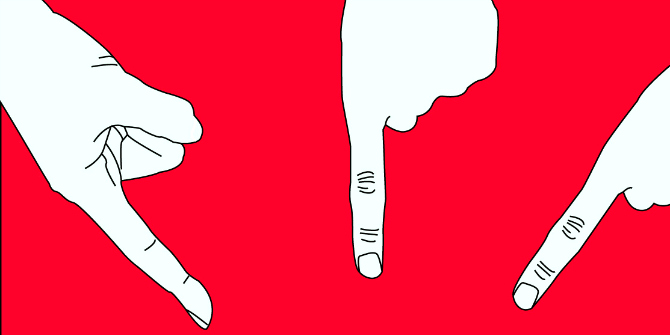In Humilitation in International Relations: A Pathology of Contemporary International Systems, Bertrand Badie addresses the longstanding use of humiliation as a systemic practice wielded by dominant powers within the international state system. While Badie’s optimism regarding the capacity of greater social integration to quell the consequences of humiliation may not convince all readers, this important book and its fascinating historical examples are more relevant than ever, writes Caroline Varin.
Humiliation in International Relations: A Pathology of Contemporary International Systems. Bertrand Badie. Hart Publishing. 2017.
Humiliation in International Relations: A Pathology of Contemporary International Systems was originally published in French in 2014. The book combines International Relations theory, political psychology and sociology to address the enduring theme of humiliation among nations. While the structure is clearly set out, with a historical/theoretical overview and a thorough analysis of the contemporary social and political consequences of this systemic practice of humiliation, the style remains densely academic, thereby reaching a limited audience. This is a pity as the author, Bertrand Badie, makes an important contribution to International Relations theory here, and his many historical examples of political humiliation are fascinating.
Humiliation, Badie argues, has become a norm in International Relations. It is systematised, legalised and applied liberally by the dominant powers in the international system. Entrenched in a realist Westphalian world where ‘the strong do what they will and the weak suffer what they must’ (Thucydides), states have been deliberately humiliating one another throughout history: China was brought to its knees after its defeat in the Opium Wars, first by the British and Europeans and later by the Japanese. Germany was humiliated after World War I in the Treaty of Versailles, precipitating the rise of Hitler and the outbreak of World War II. Following the fall of the Soviet Union, Russian leaders were marginalised and even derided, a behaviour that Western countries often try to perpetuate today.
The use of humiliation in statecraft has been a weapon wielded by diplomats representing the most powerful nations of the time. This strategy is far from over, however, as international organisations continue to impose a hierarchy of powers in a world that is supposed to be, at least in rhetoric, horizontal. The exclusion of states from ‘clubs’ — such as the G7, UNSC and NATO, for example — serves to relegate them to secondary status. The United Nations system of sovereign states is therefore undermined by its decision-making structure, by the ongoing labelling of states as ‘rogue’ or ‘immoral’ and by the non-proliferation treaties that allow for some states to become nuclear powers while forbidding others from reaching equal status.
 Image Credit: Blame (周小逸 Ian CC BY 2.0)
Image Credit: Blame (周小逸 Ian CC BY 2.0)
The problem is that while humiliation might be a political instrument for those in power, it has severe social consequences on entire nations. Badie explains that ‘humiliation is memory; it is collective narrative, and even more crucially, it is a founding narrative’ (3). It has become part of the identity of states, from China’s rhetoric of losing face to France’s re-interpretation of its collaboration/resistance with the Germans. The practices of colonialism and the processes of decolonisation did not end the humiliation of populations in Africa, Asia and Latin America who continue to be marked as secondary citizens, suffering from stigma that is repeated in the existing systems surrounding passports and migration.
Growing inequality, not just between states but also between citizens, has dangerous repercussions, as evidenced in the rise of extreme nationalism, fundamentalism and terrorism in many countries today. Badie explains this phenomenon in terms of the ‘failure of imitation, and imitation that was too strong’ (129), leading populations to rebuild an identity in opposition to the ‘other’. The Arab Spring is described as a ‘postmodern response to humiliation’ (135), highlighting the deep social impact of a history of direct and indirect foreign rule. Such social movements are further facilitated in the age of globalisation where comparisons and communications easily cross borders, emphasising the differences and severe inequalities between people, and where non-state actors emerge with unprecedented ease, capitalising on humiliation as a form of popular mobilisation.
While history cannot be changed, Bertrand Badie ends his book on a positive note, arguing that the international system can implement social integration on a global scale that would ease the symptoms of humiliation. Taking a sociological approach, he argues that the increasing inequalities created by globalisation are compounded by a political system that denies equal status to all actors while utilising a rhetoric of multilateralism and cooperation that simply does not fulfil promises or expectations. By coating the political in misleading messages, politicians have lost the plot. And yet, Badie argues that the international system can change: ‘whatever may be the costs of adjustments that must be paid’ (168). The West must yield to the rest of the world by employing foreign policy based on the three following principles: it must establish a policy of diversity; it must be social, taking into account social security as a means to integrate people; and it must truly be multilateral, celebrating an interdependent world that benefits from legitimacy in the eyes of all players.
Badie’s optimism will not appeal to all readers as global politics today appears increasingly polarised, with regionalism and nationalism on the increase. The United States is pushing forward a more isolationist policy and international organisations are struggling to survive, let alone make profound and necessary changes. The world order has changed since Badie first published this book in 2014. His analysis on humiliation and statecraft may be more relevant than ever.
Please read our comments policy before commenting.
Note: This article is provided by our sister site, LSE Review of Books. It gives the views of the author, not the position of EUROPP – European Politics and Policy or the London School of Economics.
_________________________________
Caroline Varin – Regent’s University
Caroline Varin is a lecturer at Regent’s University where she specialises in global conflict and international security. She received her PhD from the London School of Economics and holds an LLM from the Universita di Bologna. Caroline is the author of Mercenaries, Hybrid Armies and National Security (Routledge), and Boko Haram and the War on Terror (Praeger).


 Find this book:
Find this book: 


Interesting, and although a good addition to the booklist of academics, on wonders what value this book might have for diplomats, politicians and top bureaucrats. As the author seems to indicate, humiliation is dished out at a price. Usually there is some short term gain, but as we know from experience, humiliation is not forgotten. I think, actually, that that kind of experience is epi-genetically wired in and passed on. The perpetrators of dishing out humility hope for gains, but imo in the long run its comes to take revenge. That must be well-known in circles which control people, and obviously amongst those advising them, and the reckoning is that short term gains are all that matters, because in politics as in finance and commerce, short term gain allows for an advantage which can be built upon, to lever and wedge yet more short term gain, which, the theory goes and practice attests to, can be exchanged for long term gains and indefinite advantages over the Other.
Well, whosoever wishes to avail themselves of such tactics and strategy does so in the hope of loading the disadvantages onto others, often the next generation. It works a treat, usually, even in personal relationships and, more importantly, in the dynamics of family life, where children are subliminally trained to dish out or cop unquestionably a lot of emotional and mental abuse. That is how people are trained. For their own good, we are told. However, not least due to the internet, people who are being abused are getting wiser. People who were abused and got over it are wiser now, and they know that humiliation extracts its own revenge on society.
As Theresa May so convincingly proved, to allow oneself to be humiliated and, indeed, as in her case, to put oneself into a frame of mind and negotiating position where one begs to be so humiliated in order to pull in the slightest of public relations kudos while shafting your country, your people and your proud tradition, well, it is, in diplomatic terms, very unhelpful. It will not wash. People remember, even subconsciously. Indeed, the collective unconsciousness of a people overrides reason, or appeals to reason, since there are accounts to be squared. It takes time, but sooner or later, as the EU cabal will find out, accounts will be paid by they who opened them and drew upon them. The old guard will do its stuff. They must, otherwise there would be no justification for its removal. Karma at work, pure and simple.